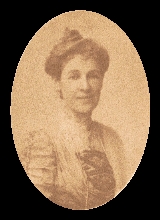
Florence Earle Coates
Florence Earle Coates was an American poet born in Philadelphia, Pennsylvania. Granddaughter of noted philanthropist Thomas Earle, and eldest daughter of Philadelphia lawyer George H. Earle, Sr. and Mrs. Frances ("Fanny") Van Leer Earle, Mrs. Coates gained notoriety both at home and abroad for her works of poetry—over two-hundred of which were published in literary magazines such as the Atlantic Monthly, Scribner's Magazine, The Literary Digest, Lippincott's, The Century Magazine, and Harper's.
Sourced
-
-
- Mrs. Coates on Matthew Arnold—Literary and social critic who both encouraged and inspired Mrs. Coates' writing, and was a guest on several occasions at the Coates' Germantown, Philadelphia, Pennsylvania home during his stays in Philadelphia (31 March 1894).
-
-
-
- Taken from the inscription on Mrs. Coates' headstone which is excerpted from a memorial poem she wrote for Eliza Sproat Turner, who died on 20 June 1903.
-
-
-
- Mrs. Coates on her Aunt (ca. September 1916), Mrs. Caroline Earle White—President and founder of The Women's Pennsylvania Society for the Prevention of Cruelty to Animals and the American Anti-Vivisection Society.
-
-
-
- The New York Times (10 December 1916)
-
-
-
- The New York Times (10 December 1916)
-
Quotes about Florence Earle Coates
- I am told [Mrs. Coates] bears me in mind and is of a disposition to look with something of favor on my work—which I might say, quoting one of William's playful quips, 'shows her good sense.' They tell me Mrs. Coates is quite a woman among women—is beautiful, shines with great brightness, and, by those who know her well, is admired and cherished...(93) I don't know Mr. Coates but I know the wife—a beautiful, true woman, I have always believed her. We have had several talks together—or maybe only one talk: I am not clear about that now—but I shall always remember what she said—the effect of her talk, which was mainly about Matthew Arnold, who was her guest in Germantown. Arnold is a man for whom I never seem to be able to get up any stir—with whom I never have had and never could have a thorough-going affinity. But Mrs. Coates gave me the other side of him—the social side, the personal side, the intellectual side—the side of deportment, behavior—the side which I ought perhaps most to hear about and did willingly and gladly hear of from her. For every man has that better thing to be said of him—is entitled to all it may mean, signify, explain...(112) Yes, tell the Coates people—Mrs., Mr. Coates—to come over: I will see them...(156) I saw [Mr. and Mrs. Coates]—was glad to see them: both of them are so good, cordial, sincere—she particularly. It does my old eyes good to look at such a woman...(215) The letter [Mrs. Coates had sent to me] that came with [the poem, "The Promised Land"] was very hospitable, forth-giving: I liked it: indeed, the letter was a better poem than the poem: a real poem, in fact...(396)
- Walt Whitman, as told to Horace Traubel in With Walt Whitman in Camden: July 16, 1888-October 31, 1888 [numbers above refer to pages].
- Mrs. Coates is the very incarnation of contradiction. The action of her life is cast along the lines of conventional routine; but the hidden and real existence of the woman is carried on miles beyond and above all the material concerns, in the pure ether of the poet's realm. She will shut herself up with the "wide-eyed muse" to round a sonnet of majestic reach, or she will merge into the gay world, the laces of a dutchess about her, precious stones at her throat and glowing roses on her breast, there to dazzle all listeners to her conversation, in which bon mot, persiflage, eloquence and philosophy are interwoven. She is a "fine lady," and yet her poetry is never tainted by "fine ladyism." She is a bluestocking, but with none of the unlovely signs of bluestockingism about her. Another woman with Mrs. Coates' voice, mobile face, and evident histrionic instinct would have dashed away from the conventional life and sought vent for the "tempest within" in the mimic world of the stage, but Mrs. Coates is mistress of a perfectly ordered home.
- Marianna F. McCann, from The Philadelphia Inquirer, 13 May 1894: her first impression upon meeting Mrs. Coates some years earlier at a reception in honor of French author Madamme Henry Gréville.
- As generous as a woman and as inspiring as a poet as she is discriminating in hero worship, this appreciation of "the noblest man that ever lived in the tides of time" is dedicated by her friend, THE AUTHOR.
- Dr. Matthew Woods—from his book, In Spite of Epilepsy (1913)—which he dedicated to Mrs. Coates.
